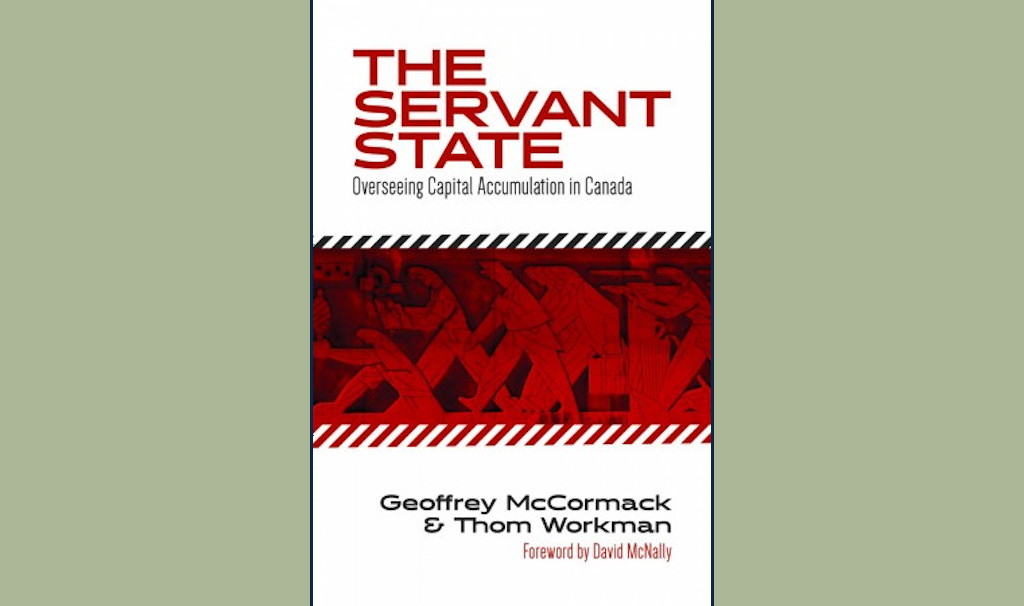“The Servant State – Overseeing Capital Accumulation in Canada”
by Geoffrey McCormack and Thom Workman
Fernwood Publishing, 2015
Reviewed by Tim Heffernan
————————————————————-
The Servant State is a valuable book, useful for its analysis and wealth of data on the workings of Canadian capitalism from a Marxist perspective. As the authors admit,
“the analytical standpoint is not that of the oppressed …. It is imbued less with a mood of indignation and more with the inner tendencies of capitalism. The eye of inquiry is on capitalism and its rhythms of crisis …” (preface, page x)
Thus, from the preface, we are given fair warning that this is not going to be a book that inspires you to take to the streets. Fair enough, not every work of Marxist analysis needs to be, or should be, a rabble rouser. However, it’s one thing to be descriptive and analytical, it’s another thing to write in a way that will have even an educated reader rushing to the dictionary. Thus we have a passage like this, by no means untypical of the authors’ prose:
“In this construal there is no ontological hierarchy between essence and phenomena, no organic connection between the world in its unfolding and the world in its truth, and no distinction between necessary and contingent features of history. All such things are sacrificed on the altar of an ontological mechanistic and Humean-inspired epistemological scientific orthodoxy.” (page 6)
It is one thing to admit that you are not writing for a mass audience, it is something else entirely to consciously confine yourself to an audience in a sub-set of academia. This is unfortunate since the material itself in the book is worthy of a wider hearing, particularly among socialists and labour activists. I am not arguing for dumbing down, just a straightforward, jargon free, style of writing.
Correctly, the authors do not buy into an explanation of the current state of the Canadian economy as being the simple hangover from the 2007-08 financial crisis or even the extended period of neoliberalism dating back to the mid 1980s. Instead, it is seen as just the latest in a series of crises that are endemic to capitalism. They go even further by arguing, as the title of their book suggests, that the role of the Canadian state has been to come to the rescue of capital at the expense of labour.
“Our analysis works with an understanding of the capitalist state as an array of institutions which have developed historically to optimize capital accumulation for the dominant capitalist class and which, in doing so, must 1) play by the rules of the extremely coercive character of all capitalist social formations and 2) forever wrestle with capitalism’s immanent tendencies towards crisis.” (page 23)
The “meat” of the 131 page book is found in the 4 chapters on:
- Canada’s Experience through the Global Slump;
- Crisis, the Circuit of Capital and State Intervention;
- Wages Through the Crisis Period;
- The Hidden Agenda of Austerity.
Despite the overly academic language, these chapters are useful for their analysis and the provision of up-to-date statistical information, graphs and tables. Unfortunately, the same cannot be said of the concluding chapter Left Solitudes and the Wilting of Politics which is unabashedly written for those whom the authors call “socialist intellectuals”. The authors’ claim that “socialism can only be informed by a theoretical understanding of capitalism and theory”. At the same time, they seem to disdain those who arrive at a socialist understanding from “a gut level”. Undoubtedly, theory is important to gain an insight into the workings of capitalism but it’s not the only way that people come to a socialist understanding. Moreover, if the authors really do believe in the importance of theory, they might want to consider rewriting their book without the academic jargon so that it could reach a wider audience.
McCormack and Workman end this chapter of the book with: “the socialist vision is not alive and well at the moment”, from which I infer that it is the intellectuals who have the vision problem. Lip service is paid to “outstanding acts of resistance and fleeting moments of defiance” without stating what these acts and moments are. Perhaps the book was written before the Bernie Sanders phenomenon, the election of Jeremy Corbyn, the votes for Podemos in Spain, the public sector strikes in Quebec or the anti-water charges movement in Ireland. That’s too bad as these are more than fleeting moments. They provide strong evidence that, however confused and tentative these movements may be, at a gut level, the working class is starting to draw socialist conclusions.
To sum up, read the book for its useful analysis and relatively up-to-date statistical information but ignore the pessimistic political conclusions.




